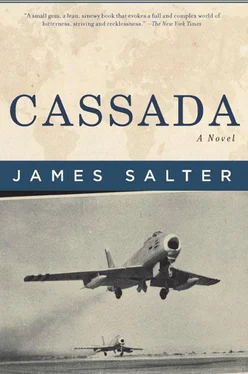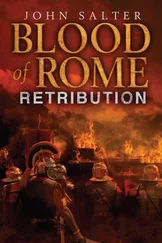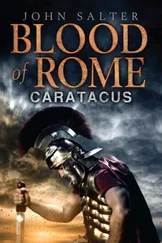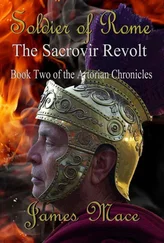“Some of them got over twenty hours apiece already,” Harlan said though Dunning had gone. “I know that for sure.”
The scramble phone rang. The two alert pilots were already out the door and running across the grass by the time the horn began. Isbell was looking at his watch. It seemed a long time before the engines started. Then came a great swelling of sound as the ships pulled out and started down the taxiway, moving fast. Gradually quiet returned. About a minute later they could be heard taking off.
“Just the same, I bet they get twelve hundred,” Harlan was saying. “They always get a lot of time. Maybe they don’t brief so much.”
All that morning there were scrambles, four or five at least. “B” Flight was in luck. There were days when the phone never rang. Wickenden, the “A” Flight commander, had drawn up a chart to show how his flight had had four days of bad weather since they’d been there and Grace’s flight none; they were getting all the time, he complained.
“It’ll average out,” Isbell told him.
“It never does,” Wickenden said. He had Phipps who’d joined at the same time as Godchaux and they’d come from flying school together. Godchaux now had almost a hundred hours more.
“Why is that?” Isbell said.
“He’s in Grace’s flight. Grace is like Pine. You know that.”
“I don’t think so,” Isbell said.
At midday, silvery and slow, the courier floated down the final approach and then skimmed for a long time near the ground getting ready to touch. Nose pointed high, it taxied in. Phipps went to meet it. He stood off to one side and watched it swing around, the grass quivering behind and pebble shooting off the concrete. When the engines died he walked up and waited for the door to open. There was mail, spare parts, and one passenger, a second lieutenant wearing an overcoat. His baggage was handed down. It turned out he was joining the squadron. “This is the 44th, right?”
“Yeah, this is it. Well, you’re lucky.”
“What do you mean?”
“Nothing,” Phipps said. “It’s just what they told me.”
The new man’s name was Cassada. He was Phipps’s height with hair a little fairer and combed back, Anglo style. Phipps helped him carry his bags while being careful not to be too responsive to questions. Cassada was looking around as they walked. Were these their planes, he wanted to know? Were pilots assigned a plane? Were their names painted on them? Phipps answered yes.
“I’ll take you over to meet Captain Isbell,” he said.
“Is he the squadron commander?”
“Who, Captain Isbell? No, he’s ops.”
“Oh,” Cassada said.
He was just out of flying school but he’d served as an enlisted man for two years before. He didn’t look that old.
In the mess they found both the major and Isbell. Phipps presented the new man.
“Cassada,” the major repeated as if remembering the name.
“Yes, sir.” There were unfamiliar faces all around.
“That’s a pretty famous name,” Dunning said. “You don’t happen to have anyone in your family who’s been in the service?”
“Just my uncle, sir.”
Dunning stopped chewing. “Your uncle? That’s not the general, by any chance?”
“No, sir. He was only a private.”
“You’re no relation to the general?”
“No, sir. That’s QUE, I think. My name is spelled CASS.”
“CASS.”
“Cassada.”
Dunning resumed eating. “Did you just get in?”
“He just got in on the courier,” Phipps said.
“I was talking to Lieutenant Cassada, here.”
“Yes, sir.”
“Have you had your lunch?”
“No, sir.”
“Go ahead through the line and then come on back,” Dunning said.
While Cassada was eating, Dunning asked him a number of questions, where he’d gone to flying school, how much time he had, where he was from, but in fact he listened carefully to only one or two of the answers. He was telling Cassada what an outstanding squadron he had joined, picking his teeth as he spoke. He seemed unobservant. He relied on strong instinct, deciding right off if a man could cut it or not. In the case of Cassada who had not said a lot, perhaps a dozen words, Dunning was not much impressed. He liked second lieutenants who reminded him of himself when he was one. Roaring. Full of hell, like Baysinger who had a wide gap between his front teeth and one night in the club, just as drunk as Dunning, got into a wrestling match with him and broke his leg. Baysinger had long since completed his tour and was gone, as were the crutches that Dunning hobbled around on for two months afterwards.
Dunning had on a wool shirt, a green tie, and a tweed jacket. Shaking some tonic on his hair, he combed it down. A damp towel hung at the foot of the bed. He took it and cleaned his shoes. He looked like a farmer, a corn-fed farmer on a Saturday night. As a final touch he stuffed a khaki handkerchief in his breast pocket and a thick wallet, folded double, into the back pocket of his pants.
“Might turn out to be a real whoop-de-do,” he commented to Isbell.
There was a drab gasthaus on the long road of trees that led to town. Dunning had gotten to know the woman who ran it well enough to slap her familiarly on the behind and tell her to bring whatever it was, a prima schnitzel or some good, none of that cheap stuff, wine. He knew a little German. He could say something tasted like rat poison, which always brought a laugh.
A cheer went up when he and Isbell entered. Everybody was there or had better be, even the armament and communications officers. All four flight commanders, not sitting together but sown among the rest, Wickenden, Grace, Reeves, and Cunati, who had false front teeth, their history unknown. Isbell sat down beside Harlan who was debunking something, as usual, in this case the war which had been over for a decade. He didn’t know that much about it, he admitted, picking at the wet label on a bottle, but he knew one thing: we should never of got involved. It was never our business. His pale blue eyes watched what his fingers were doing. It didn’t do us a bit of good.
Grace had a different view: it was all part of a bigger fight.
“What bigger fight?”
“Against communism. The Germans were really helping us.”
“You mean they were on our side?”
“In a way.”
“That’s news to me.”
“A lot of things are,” Grace said.
“Oh, yeah?” Harlan turned his head. “What do you say, Captain?”
“I think it’s about even.”
“What do you mean, even?”
“Neither of you know what you’re talking about.”
“Aw, don’t try to flatter us.”
“Gee, that’s a big word for you,” Grace said.
It was Friday night, the night for drinking. It would go on for hours. Isbell sat, not really listening, his gaze moving over the crowd, casual but searching, he was not sure for what. True comrades perhaps. Even friends.
Reeves, he thought, looking at him, unknowable, really. Wickenden. He hesitated there. Wickenden’s round head, hair cut close, shaved like a Russian’s, the scalp gleaming through. He was talking about something, the new velocities, the tremendous shocking power. Even a gut shot would bring them down now—shatter their nervous system. He didn’t approve of that. His mouth tightened. Too much power, it took the sport out of it. You ought to have to hit them in a spot the size of a plum. Right in the brainpan. The heart. Or lose them. “Give the beast a chance.”
It was a cold night. Across the dim field Isbell could make out some kind of animal moving. Then he could see it, a hirsch that hadn’t presented a very good target, drifting through the black woods, its fine head and antlers. There was a splintering frost. The hirsch was stepping slim-legged through it, unsteadily but with a matchless grace, stopping every couple of yards while his stomach filled with blood. The sides of his body were wet with it, heaving gently, and something was behind him, trailing him in the dark. This way! Something was crashing through stiff branches. The hirsch, feeling for the one time ever a terrible dizziness, begins to move faster, in panic. The twigs are exploding. Over here! This way!
Читать дальше












